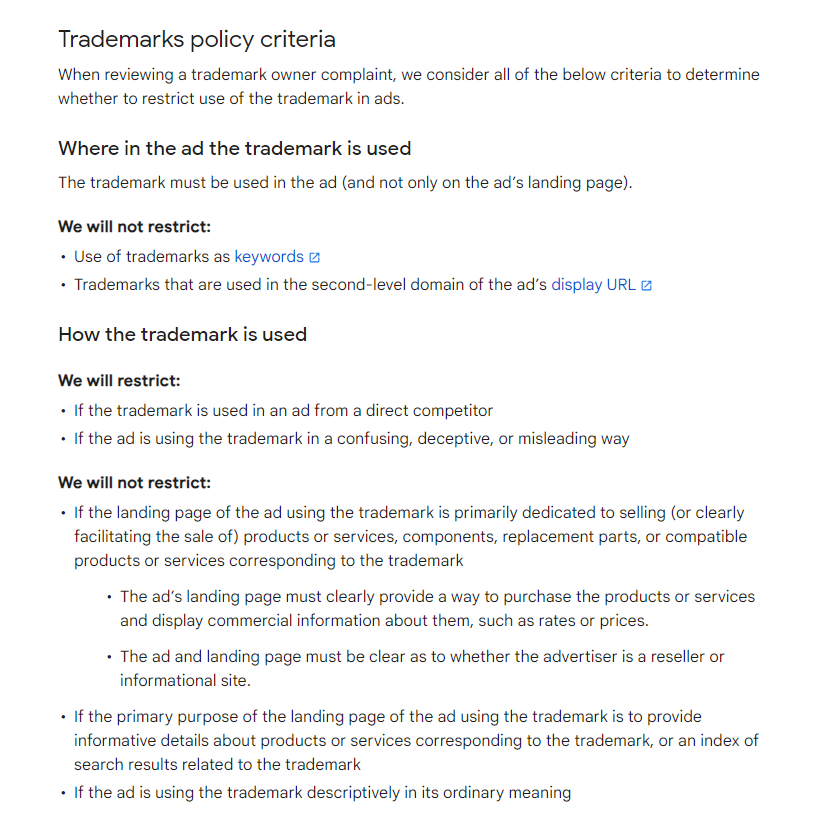Can I use competitor brand keywords in Google Ads?
The answer is not as simple as yes or no. Diverting traffic from your competitors to your doorstep involves ethical considerations and smart marketing tactics.
Surely, everyone loves a shortcut to success. Yet when it comes down to using names that are legally owned by others in our advertisements, things get complicated.
Before you join bidding wars over branded terms that aren’t yours, consider the rules of engagement set by Google and the murky waters of trademark laws.
How do we tread this thin line between clever, aggressive advertising and outright infringement without stepping on any legal landmines?
Let’s dive in.
Table Of Contents:
- Can I Use Competitor Brand Keywords in Google Ads?
- The Basics of Advertising and SEO on Competitor Brand Names
- Legally, Is This Allowed?
- How to Address Competitor Bidding on Google Ads
- FAQs: Can I Use Competitor Brand Keywords in Google Ads?
- Conclusion
Can I Use Competitor Brand Keywords in Google Ads?
As a digital marketer, you’ve probably wondered if you can use a competitor’s brand name, product name, or even their slogan as keywords in your Google Ads campaigns. After all, if someone is searching for your competitor, they might be interested in what you offer too, right?
But is this even allowed? And if so, how can you do it effectively?
For over ten years, I’ve been running PPC campaigns and have seen how bidding on competitor brand keywords can help in reaching new customers. But it’s definitely not easy or risk-free.
Let’s get one thing straight: Google allows you to bid on competitor’s branded keywords. This means you can set up campaigns targeting branded terms to try and capture traffic from users searching for those brands.
That said, there are crucial guidelines and strategies you’ll need to follow.
First, while you can bid on a competitor’s brand name as a keyword, you cannot use their brand name in your actual ad copy unless you have explicit permission from them (which is unlikely).
So your ad headline can’t say something like “Better Than [Competitor’s Brand]” or “[Competitor’s Brand] Alternative.”
You also need to be careful about using dynamic keyword insertion, which automatically inserts the user’s search query into your ad headline or description.
If you have a competitor’s brand name as a keyword and you’re using dynamic insertion, their brand could end up in your ad copy without you realizing it. That’s a big no-no.
Another thing to consider is that even if you’re allowed to bid on a competitor’s branded keywords, they might not be too happy about it. I’ve had clients whose competitors retaliated by bidding on their brand terms in return. It can quickly turn into a pricey bidding war.
While bidding on competitor brand keywords can be a powerful tactic, it’s not something to jump into without careful thought. You need a well-crafted strategy and budget.
Plus, be ready for some possible pushback from competitors.
Read up on four legal cases involving competitor keyword bidding.
The Basics of Advertising and SEO on Competitor Brand Names
If you’ve considered all sides and opted to target competitor brand keywords in your Google Ads strategy, how do you proceed from here?
Let me share a few useful tips:
- Do your research: Before you start bidding, make sure you have a good understanding of your competitor’s brand positioning, unique selling proposition, and target audience. This will help you craft ad copy that speaks directly to the needs and pain points of people searching for their brand.
- Focus on benefits, not the brand: Remember, you can’t use your competitor’s brand name in your ad copy itself. So instead of focusing on their brand, focus on the unique benefits and value that your product or service offers. Highlight what makes you different and better.
- Use long-tail keywords: In addition to bidding on your competitor’s brand terms, consider using longer-tail keywords that include their brand name plus other relevant words like “alternative,” “competitor,” or “vs.” This can help you reach people who are actively considering their options.
- Monitor your results closely: Bidding on competitor keywords can get expensive fast, so it’s important to keep a close eye on your campaign performance and adjust your bids and budgets accordingly. Make sure you’re getting a good return on your investment.
Another tactic I’ve seen work well is creating comparison pages or blog posts that directly compare your product or service to your competitor’s. You can then bid on keywords related to those comparison searches, like “[Your Brand] vs [Competitor Brand]” or “[Competitor Brand] alternative.”
Here’s an example of a blog post we published comparing BrandWell and Jasper.
Keep those comparison pages honest and straightforward. Don’t criticize other companies or spread misinformation. Highlight what sets you apart in a positive light.
Don’t overlook the impact of SEO when dealing with competitor brand names. Alongside bidding on paid search ads, make sure you’re boosting your organic rankings for those crucial competitor keywords.
That means creating high-quality, relevant content that targets those keywords naturally, building backlinks to those pages, and making sure your on-page SEO is on point.
If you can rank organically for competitor brand terms, you’ll be able to capture some of that search traffic without having to pay for every click.
Legally, Is This Allowed?
The short answer is yes, but there are some important caveats to keep in mind.
Google’s trademark policy allows advertisers to bid on trademarked terms as keywords, even if they don’t own those trademarks. However, using trademarked terms in your actual ad copy is where things get a bit trickier.
If you use trademarked competitor terms in your ad headline or description in a way that is confusing or deceptive about the identity of the advertiser, you could face a trademark complaint. This could lead to your ads being disapproved or even account suspension in severe cases of trademark infringement.
Here is Google’s policy on trademarks on Google Ads:

So while bidding on competitor brand keywords is fair game, be cautious about using those trademarked terms in your ad copy.
Stick to factual, comparative advertising rather than anything that could be seen as misleading or infringing on their intellectual property including trademarks.
Focus on highlighting your own unique value proposition rather than mentioning them by name. You can still capture their brand traffic without running afoul of any trademark infringement issues.
How to Address Competitor Bidding on Google Ads
Now what if it were the other way around and competitors bid on your branded terms?
Seeing your competitors bidding and snagging traffic on your brand keywords can be infuriating.
Fortunately, there are several strategies you can use in Google Ads to protect your brand and reclaim that lost traffic.
Protect Your Name by Running Ads on Your Own Name
The first and most important step is to start bidding on your own brand keywords if you aren’t already.
Yes, you’ll be paying for clicks that may have come through organic search results anyway. But if you don’t bid on your brand, you’re basically rolling out the red carpet for competitors to steal that direct traffic.
By bidding on your own brand terms, you can ensure your ads show up at the top of the search results, above any competitor ads.
You’ll also likely have a very high Quality Score for your own branded keywords, meaning you can bid less and still maintain top ad positions.
I always recommend clients allocate a portion of their marketing budget to branded keyword campaigns. It not only helps you control more of the SERP real estate for your brand terms but also drives more click-through rate to your site vs. competitor sites.
Clicks on your own brand terms also tend to convert at a higher rate than non-brand searches.
Petition Google Ads for Trademark Protection
If competitors are using your actual trademarked brand terms in their ad copy, you can submit a trademark complaint to Google.
If Google finds that the use of your trademark is violating its rules, it will disapprove the offending ads and restrict the use of your trademarked terms in ad copy.
This won’t stop rivals from bidding on your brand keywords — it only blocks them from using your trademarked terms in their ad text.
For a complaint to stick, you’ll need to provide evidence that you own the trademark.
From my experience, well-known brands with registered trademarks see the most success here. Smaller companies or ones with common brand names might face more challenges.
However, pursuing action is worthwhile if you suspect harmful infringement by competitors.
Fight Fire with Fire
If multiple competitors are bidding on your brand keywords and driving up your CPCs, sometimes you have to fight fire with fire.
By that I mean start bidding on their brand keywords as well.
Now, I’m not advocating for an all-out bidding war. That rarely ends well for anyone except Google. But a targeted competitor ad campaign can help you recapture some of the lead generation and potential customers you may be losing.
Being strategic is key. Don’t just bid on every competitor’s brand terms without thinking it through.
Focus your efforts on those that pose the biggest threat and where you can clearly show a better value. Keep an eye on your marketing budget and ROI because costs can rise quickly.
In your ad copy, highlight what sets you apart from that specific competitor.
What can you offer that they can’t? Why should the searcher choose you instead?
A little comparison shopping can be very persuasive in your marketing efforts.
FAQs: Can I Use Competitor Brand Keywords in Google Ads?
Can we use competitor brand keywords in Google Ads?
Yes, you can bid on competitors’ brand names but your ad copy must not mislead or violate trademarks.
What are not eligible keywords in Google Ads?
Your ad can’t contain banned words, misleading phrases, or infringe on intellectual property like trademarks.
Can you target competitor keywords?
Bidding on competitor brands and terms is allowed but be cautious to avoid legal issues with trademark infringement.
Conclusion
If you’re wondering whether you can use competitor brand keywords in Google ads, the answer is yes. But beware of the legal and ethical implications of this strategy.
Targeting competitor brand keywords in ad campaigns can be a powerful strategy to enhance your brand visibility and capture valuable traffic. However, this approach requires careful navigation of both Google’s policies and potential legal considerations. By understanding the nuances of targeting competitor keywords, you can create compelling, relevant ads that effectively attract and convert users.
Strategically, make sure your ads offer clear value propositions and solutions to potential customers. Monitor your campaign performance and continuously optimize to balance costs and benefits.
When targeting competitor brand keywords, be sure to stay within the bounds of marketing ethics and intellectual property laws.
Ultimately, while this tactic can give you a competitive edge, it should be part of a broader, well-rounded marketing strategy that prioritizes compliance, relevance, and user experience.




